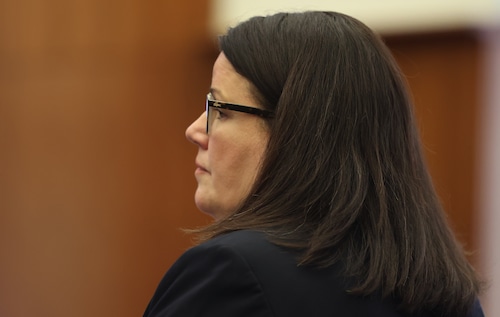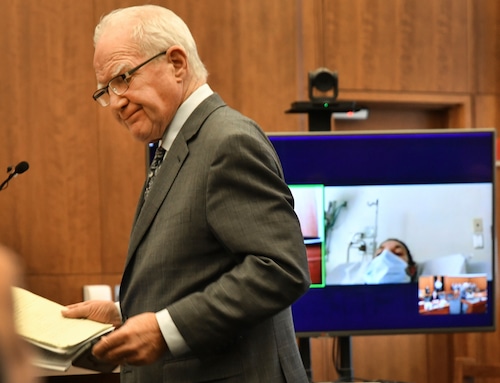It has been two years since authorities said Lindsay Clancy killed her three children. Yet, a trial remains nearly a year away.
The 34-year-old Duxbury mother, paralyzed from the waist down, is being held for court-ordered treatment at Tewksbury Hospital. She is pursuing what’s known as the insanity defense for the events that unfolded on Jan. 24, 2023, when her three children were killed.
Plymouth County authorities indicted Clancy on three counts each of murder and strangulation in the deaths of her three children: Cora, 5; Dawson, 3; and 7-month-old Callan.
In the days after the killings, Clancy’s attorney said at her arraignment that she suffered from severe mental illness at the time, dealt with complications from overmedication and grappled with postpartum depression — and potentially postpartum psychosis.
Her husband, Patrick Clancy, has since moved to Manhattan and told The New Yorker that he hoped to root out “lies and misinformation” surrounding Clancy’s case.
“I wasn’t married to a monster — I was married to someone who got sick,” Patrick Clancy said in an article published in October 2024.
In a GoFundMe started by Patrick Clancy only days after the children died, he wrote, “The real Lindsay was generously loving and caring … All I wish for her now is that she can somehow find peace.”
The fundraiser raised more than $1 million.
Clancy’s case renewed attention surrounding perinatal and postpartum mood and anxiety disorders, also known as PMADs. One of the disorders, postpartum psychosis — which Clancy’s defense attorney has referenced — is rare and affects one or two in a thousand women.
Clancy’s trial is scheduled for Jan. 5, 2026, and her case renewed conversations about postpartum mental health and how well it’s understood.
‘Deliberate premeditation’ or momentary psychosis?
Clancy worked as a delivery nurse at Massachusetts General Hospital and letters of support from friends and longtime colleagues described her as a caring mother.
“(Clancy) is a compassionate, supportive and excellent nurse,” wrote Grace McNulty, a registered nurse, in a letter submitted to the court. “There wasn’t anything she loved more than her children Cora, Dawson, Callan and husband Patrick. I am proud to stand by her.”

Lindsay Clancy is a Duxbury mom facing murder charges.
The letters stand in stark contrast to the calculating killer described by prosecutors.
Prosecutors said that Clancy was a danger to herself and others and that she planned the killings with “deliberate premeditation and extreme atrocity and cruelty.”
At her arraignment, they described how she asked her husband to pick up medicine for the children from CVS and ordered take-out from a restaurant in a neighboring town. She used Apple Maps to figure out how long the errands would take, and between 5:15 p.m. and 6 p.m. that day, the children were strangled with exercise bands, authorities said.
Clancy then made “superficial” cuts to her wrists and jumped out of a second-floor window in an attempted suicide, according to prosecutors.
“The defendant did not take advantage of the situation when her husband left the house that night,” Plymouth Assistant District Attorney Jennifer Sprague asserted at Clancy’s arraignment in February 2023. “She created the situation, and she used Apple Maps to make sure she would have enough time to strange each child before her husband returned from where she had sent him.”

Plymouth County Assistant DA Jennifer Sprague watches the arraignment of Lindsay Clancy at Plymouth District Court on Feb. 7, 2023. (Photo by David L. Ryan/The Boston Globe via Getty Images)Boston Globe via Getty Images
Clancy’s attorney, Kevin Reddington, strongly denied the characterization of a scheming mother. He instead described her mental health troubles in the months before the killings and how she failed to receive adequate treatment.
The Duxbury mother was not officially diagnosed with postpartum depression before the children’s deaths, but doctors prescribed a cocktail of medications for generalized anxiety, according to Reddington.
Weeks before the killings, she voluntarily checked herself into McLean Hospital, a psychiatric facility in Belmont, on New Year’s Day. The hospital discharged Clancy a few days later on Jan. 5, 2023, and did not find her a danger to herself or others.
“Our society fails miserably in treating women with postpartum depression or even postpartum psychosis,” Reddington said, adding that it had been a “relatively short period of time” since the birth of the Clancy’s youngest child, Callan, before the killings.
In comments to reporters after the arraignment, Reddington said prosecutors showed a lack of understanding of postpartum mental health.
“Our society completely abandons women with this condition,” Reddington argued. “It’s medicate, medicate, medicate, throw the pills at you and then see how it works.”

Defense attorney Kevin Reddington presents his case to Judge John Canavan in Plymouth District Court during Lindsay Clancy’s arraignment in the killing of her three children, in Plymouth, Mass., Tuesday, Feb. 7, 2023. (Chris Christo/The Boston Herald via AP)AP
Changes to criminal law?
Countries in Europe and Asia have laws that recognize postpartum depression or postpartum psychosis in criminal matters and many allow for treatment rather than punishment.
In the United States, only Illinois recognizes the condition in criminal cases. A law passed in 2018 allows judges to weigh postpartum mental illness as a potential mitigating factor when determining sentencing.
The law also allows for women who were convicted of a felony, but who did not have evidence of postpartum disorders presented at trial or sentencing, to apply for post-conviction sentence reduction.
“This law was the first criminal statute in the entire nation that recognized postpartum illnesses for what they are, a unique, involuntary, and pernicious effect on a mother’s ability to care for and protect her child,” wrote Susan Feingold and Barry Lewis in the book, “Advocating for Women with Postpartum Mental Illness: A Guide to Changing the Law and National Climate.”
Feingold consulted with Massachusetts lawmakers — state Rep. James O’Day, D-Worcester, and state Sen. Joan Lovely, D-2nd Essex — in drafting a bill first filed in the Massachusetts State House nearly five years ago.
O’Day, the bill’s lead sponsor, previously told MassLive that the proposed law has been described as “controversial.”
He said the bill would allow criminal defendants the opportunity to present evidence of postpartum psychosis — even for extreme cases such as first- and second-degree murder.
“In Duxbury, there seems to be very little interest on the DA’s part to give any sort of credence to the possibility of what transpired having been related to some sort of mental health illnesses,” O’Day said. “And what transpired was really horrific and sad and it’s really hard for people to contemplate and wrap their heads around. And I understand that. But who in their right mind would treat their child in that manner if there wasn’t some type of mental illness potential involved with the matter?”
However, the bill has not received strong support in the state Legislature and was sent to study by the Joint Committee on the Judiciary last session.

A makeshift memorial continues to grow on January 31, 2023 in Duxbury, Massachusetts in front of the home of Lindsay Clancy. (Photo by Matt Stone/MediaNews Group/Boston Herald via Getty Images)MediaNews Group via Getty Images
O’Day argued that the law is important for criminal cases to determine whether pregnancy-related disorders could’ve driven a mother’s actions. That could determine whether a mother receives treatment or punishment post-trial.
“Postpartum mental illness needs to be investigated to do away with the idea that this was just some sort of evil act and that it was something else responsible for the act — that’s the mitigation of the scenario,” O’Day said.
In the meantime, Clancy’s attorney argued in court filings that she cannot be held criminally responsible for her actions due to her mental condition.
Yet the Clancy case has renewed calls in Massachusetts to improve screening, treatment and awareness of perinatal mental health for mothers.
Patrick Clancy told The New Yorker that Clancy suffered from insomnia and that various doctors seemed to prescribe medications hoping something would work.
He told the magazine that none of Clancy’s providers ever warned about the possibility of postpartum psychosis.
“I never even heard the term until after the kids died,” he told the magazine.
What’s next?
Earlier this month, a judge ruled that Clancy must submit to a psychiatric examination, or multiple if necessary, by an expert chosen by the prosecution.
A hearing in the case is scheduled for Feb. 7. Clancy is set to appear via Zoom.






